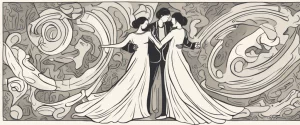——You can heal your life by Louise Hay & The Gifts of Imperfection by Dr. Brené Brown
In today’s fast-paced world, where stress and self-doubt have become all too common, the quest for self-improvement has taken center stage. Countless individuals are searching for guidance in navigating their own journeys towards self-acceptance, healing, and authentic living. Two books that have emerged as powerful resources in this realm are “You Can Heal Your Life” by Louise Hay and “The Gifts of Imperfection” by Dr. Brené Brown.
Louise Hay, a beloved author, and metaphysical teacher, presents a comprehensive and transformative approach to self-healing in her seminal work, “You Can Heal Your Life.” This profound book challenges readers to transform their thoughts and beliefs to create positive change in every aspect of their lives. Through the power of positive affirmations and fostering self-love, Hay encourages individuals to embrace their inherent worthiness and harness the limitless potential within themselves.
On the other hand, Dr. Brené Brown, a research professor and acclaimed storyteller, delves into the realm of imperfections in her book, “The Gifts of Imperfection.” Brown believes that true authenticity and wholehearted living lie in accepting our vulnerabilities instead of allowing shame and self-judgment to control our perceptions. By exploring concepts such as courage, compassion, and connections, the author guides readers towards embracing their imperfections and cultivating a more fulfilled and meaningful life.
While both Hay and Brown offer invaluable insights into personal growth and emotional well-being, their approaches differ in fundamental ways. “You Can Heal Your Life” focuses on the connection between our thoughts and our physical and emotional well-being, emphasizing the importance of positive affirmations in reshaping our reality. In contrast, “The Gifts of Imperfection” centers around the power of vulnerability and the liberation that comes with accepting our flaws and imperfections.
This comparative study aims to explore the unique strengths and perspectives presented in each of these books. By examining the core themes, methodologies, and messages of “You Can Heal Your Life” and “The Gifts of Imperfection,” we will gain a deeper understanding of the ways in which they complement and diverge from one another. Through this exploration, readers will be empowered to navigate their journey towards self-acceptance and healing, armed with the wisdom and guidance provided by these two remarkable authors.
Join us as we embark on this illuminating comparative study of “You Can Heal Your Life” by Louise Hay and “The Gifts of Imperfection” by Dr. Brené Brown, unearthing the transformative power of embracing our true selves and discovering the paths to our authentic lives.
Brief Summary of Two Books
You can heal your life by Louise Hay
You Can Heal Your Life” by Louise Hay is a self-help book that explores the power of positive thinking and self-love in creating a happy and fulfilling life. Hay believes that our thoughts and beliefs have a profound impact on our physical, mental, and emotional well-being.
The book delves into the concept of the mind-body connection and how our thoughts and emotions can manifest as physical ailments or illnesses. Hay suggests that by identifying and transforming negative thought patterns, we can heal ourselves both physically and emotionally.
Hay introduces various practical techniques like affirmations and visualization exercises to help readers reframe their thoughts, eliminate self-destructive patterns, and cultivate self-compassion and love. She also shares her own personal journey and how she was able to heal herself from a traumatic past.
“You Can Heal Your Life” is ultimately a guide to transforming one’s life by taking responsibility for our thoughts, being mindful of our beliefs, and choosing positive affirmations to create a more joyful and fulfilling existence. The book has had a profound impact on countless readers seeking self-improvement and personal growth.
The Gifts of Imperfection by Dr. Brené Brown
“The Gifts of Imperfection” by Dr. Brené Brown is a self-help book that explores the concept of embracing imperfections and cultivating wholeheartedness in order to live a fulfilling and authentic life.
In the book, Dr. Brown discusses how society places immense pressure on individuals to be perfect, which often leads to feelings of shame, unworthiness, and disconnection. She argues that true happiness and fulfillment can only be achieved by embracing our imperfections and accepting ourselves as we are.
Dr. Brown introduces ten guideposts, which are essentially attributes that can help individuals navigate the journey towards wholehearted living. These guideposts include cultivating authenticity, self-compassion, resilient spirit, gratitude, and meaningful relationships, among others.
Throughout the book, Dr. Brown shares personal anecdotes, research findings, and practical strategies to help readers let go of the need to be perfect and embrace their true selves. She emphasizes the importance of setting boundaries, letting go of comparison, and understanding the power of vulnerability.
“The Gifts of Imperfection” encourages readers to let go of societal expectations and embrace their imperfections as sources of strength and growth. It offers valuable insights and tools to help individuals cultivate a sense of worthiness, connection, and wholeheartedness in their lives.
Comparison between Two Books

Similarities in Positive Thinking
Both “You Can Heal Your Life” by Louise Hay and “The Gifts of Imperfection” by Dr. Brené Brown emphasize the power of positive thinking and its impact on our overall well-being.
1. Mindset Shift: Both books encourage readers to shift their mindset from negative to positive thinking. They emphasize the importance of adopting optimistic thoughts and beliefs as a means of transforming one’s life.
2. Self-Acceptance: Both authors emphasize the significance of accepting oneself as they are and embracing imperfections. They argue that positive thinking involves self-compassion and self-love, allowing individuals to accept their flaws and celebrate their uniqueness.
3. Affirmations: Louise Hay’s “You Can Heal Your Life” extensively discusses the use of positive affirmations to reprogram our subconscious mind and promote positive thinking. Similarly, Dr. Brené Brown acknowledges the power of affirmations and suggests utilizing them to develop resilience and foster a positive mindset.
4. Gratitude Practice: Both books stress the importance of gratitude in cultivating positive thinking. They advocate for incorporating gratitude practices into daily routines as a way to shift focus towards appreciation, which helps reframe perspectives and enhance overall positivity.
5. The Power of Beliefs: Both authors emphasize the influence of our beliefs on our thoughts, emotions, and behaviors. They highlight that positive thinking involves identifying and challenging limiting beliefs, replacing them with empowering and positive ones.
6. Self-Reflection and Self-Awareness: Both books encourage readers to engage in self-reflection and cultivate self-awareness. They promote introspection as a means of recognizing negative patterns, thoughts, and behaviors, which can then be replaced or transformed into more positive and empowering ones.
Overall, “You Can Heal Your Life” and “The Gifts of Imperfection” share a common focus on positive thinking as a transformative practice for personal growth, self-acceptance, and overall well-being. By shifting mindset, using affirmations, practicing gratitude, challenging limiting beliefs, and cultivating self-awareness, both books offer similar approaches to harnessing the power of positive thinking.
Divergences in Positive Thinking
“You Can Heal Your Life” by Louise Hay and “The Gifts of Imperfection” by Dr. Brené Brown are both self-help books aimed at personal growth and transformation. While they both touch upon aspects of positive thinking, their divergence lies in the approach they take towards this concept.
Louise Hay’s “You Can Heal Your Life” heavily emphasizes the power of positive affirmations and the role of our thoughts in shaping our reality. It encourages readers to examine their belief systems and replace negative thoughts with positive ones to manifest desired outcomes. Hay believes that by practicing positive thinking consistently, individuals can overcome physical ailments and achieve overall well-being. The book provides a plethora of affirmations and exercises that readers can integrate into their daily lives.
On the other hand, Dr. Brené Brown’s “The Gifts of Imperfection” takes a more holistic approach to positive thinking. Brown acknowledges that positive thinking is beneficial, but also emphasizes the importance of embracing all emotions, including vulnerability, fear, and shame. She argues that true positivity comes from accepting and owning our imperfections and allowing ourselves to be authentic and vulnerable. Instead of merely focusing on positive thoughts, Brown encourages readers to cultivate self-compassion, resilience, and wholeheartedness.
The divergence between these books lies in their perspectives on positive thinking. While Hay’s approach promotes a more cognitive and conscious rewiring of our thoughts for positive outcomes, Brown incorporates positive thinking within a larger framework of self-acceptance and self-compassion. Brown delves deeper into the emotional aspects of positivity, addressing the need for self-growth and self-worth beyond surface-level positivity.
In summary, “You Can Heal Your Life” centers around the transformative power of positive affirmations and thoughts, whereas “The Gifts of Imperfection” advocates for a more nuanced understanding of positivity and self-acceptance. Both books offer valuable insights into personal development, but their approaches to positive thinking vary, catering to different perspectives and needs.

Conclusion
Both “You Can Heal Your Life” by Louise Hay and “The Gifts of Imperfection” by Dr. Brené Brown are highly recommended books that can have a profound impact on personal growth and overall well-being. The choice between the two depends on individual preferences and the specific aspects of your life that you wish to focus on.
Louise Hay’s “You Can Heal Your Life” offers a powerful message of self-love, self-compassion, and the ability to create positive change in one’s life through thought patterns and affirmations. It emphasizes the connection between the mind and the body, encouraging readers to take responsibility for their own healing and transformation. This book is particularly suitable for those seeking to cultivate self-empowerment, improve their self-esteem, and shift negative beliefs or patterns.
On the other hand, “The Gifts of Imperfection” by Dr. Brené Brown delves into the topic of embracing vulnerability and embracing imperfections as a means to live a fulfilling and authentic life. Brown explores concepts like shame, courage, and connection, providing insights and practical strategies to let go of perfectionism and cultivate self-acceptance. If you’re interested in learning how vulnerability can lead to greater joy and meaningful connections with others, this book may be a great fit for you.
Ultimately, both books offer valuable insights and are well worth reading. It may be helpful to consider which aspect resonates more with your current needs and goals: self-love and healing in “You Can Heal Your Life,” or embracing imperfections and vulnerability in “The Gifts of Imperfection.”



